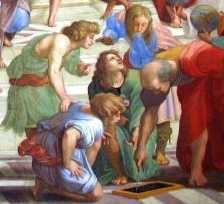You make smooth the way to follow Christ
O nimis felix meritíque celsi,
O blessed saint, exceedingly deserving of high reward,
nésciens labem nívei pudóris,
knowing no fault, of white, unstained sense of honor,
praépotens martyr eremíque cultor,
very powerful martyr and dweller in the wilderness,
máxime vatum.
greatest of the prophets.
O more than blessed, merit high attaining,
Pure as the snow-drift, innocent of evil,
Child of the desert, mightiet of Martyrs,
Greatest of Prophets.
2. Nunc potens nostri méritis opímis
Now powerful for us by your rich merits
péctoris duros lápides repélle,
drive away the hard stones of [our] hearts,
ásperum planans iter, et refléxos
make smooth our rough road, and our bent
dírige calles,
rocky paths make straight,
2. O may the virtue of thine intercession,
All stony hardness from our hearts expelling,
Smooth the rough places, and the crooked straighten
Here in the desert.
3. Ut pius mundi sator et redémptor,
That the holy Founder and Redeemer of the world,
méntibus pulsa mácula polítis,
into our polished hearts, stains having been driven out,
rite dignétur véniens sacrátos
solemnly may deign, when He comes, to direct
pónere gressus.
His holy footsteps.
3. Thus may our gracious Maker and Redeemer,
Seeking a station for His hallowed footsteps,
Find, when He cometh, temples undefiléd,
Meet to receive Him.
4. Láudibus cives célebrant supérni
With praise let the citizens of heaven extol
te, Deus simplex paritérque trine;
Thee, God one and equally three;
súpplices ac nos véniam precámur:
suppliantly we pray for pardon:
parce redémptis.
spare Thy redeemed ones.
4. Now as the Angels celebrate Thy praises,
Godhead essential, Trinity co-equal;
Spare They redeemed ones, as they bow before THee,
Pardon imploring.
Attributed, with some doubt, to Paul the Deacon (720-799). Metric translation by M. J. Blackner and G. H. Palmer, found in Britt p 260. These are verses 9, 11, 12 and 13 of the hymn Ut queant laxis where we get Ut, re, mi or as we know it in America, do, re, mi...anyways, it comes from the beginning syllables of certain words in the first staza of the hymn, which is traditionally sung at Vespers on June 24, the Nativity of St. John the Baptist. Since the hymn is so long, it is usually chopped up and sung at other hours. (verses 5-8 are sung at Matins under the title Antra desérti.
You may well wonder what happen to verse 10. Well, Fr. Lentini thought it was "a bit complicated" and so omitted it from the modern breviary. Thanks to Fr. Britt we still have it:
Serta ter denis álios corónant
Crowns thirty-fold crown some
Aucta creméntis, duplicáta quosdam;
enriched with increase, others double that;
Trina te fructu cumuláta centum
but a triple crown heaped with fruit a hundredfold
Néxibus ornant.
adorns thee.
Thirtyfold increase some with glory crowneth;
Sixtyfold fruitage prize for others winneth;
Hundredfold measure, thrice repeated, decks thee,
Blest one, for guerdon.
To quote Britt: "The stanza plainly refers to the Parable of the Sower, some of whose seed falling on good ground "brought forth fruit, some an hundredfold, some sixyfold and some thirtyfold" (Matt 13,8). Our Lord Himself explains the meaning of this parable (Matt. 13, 18-23). The triple crown ascribed to St. John is probably that referred to in the preceding stanza, viz., that of martyr, hermit, and prophet."
For good measure, Britt adds an extra translation of this verse by H. T. Henry (in meter no less):
Some crowns with glory thirtyfold are shining:
Others, a double flower and fruit combining:
Thy trinal chaplet bears an intertwining
Hundredfold fruitage.
I had the privelege of singing the first and last verse of this hymn at mass this morning, after communion.
